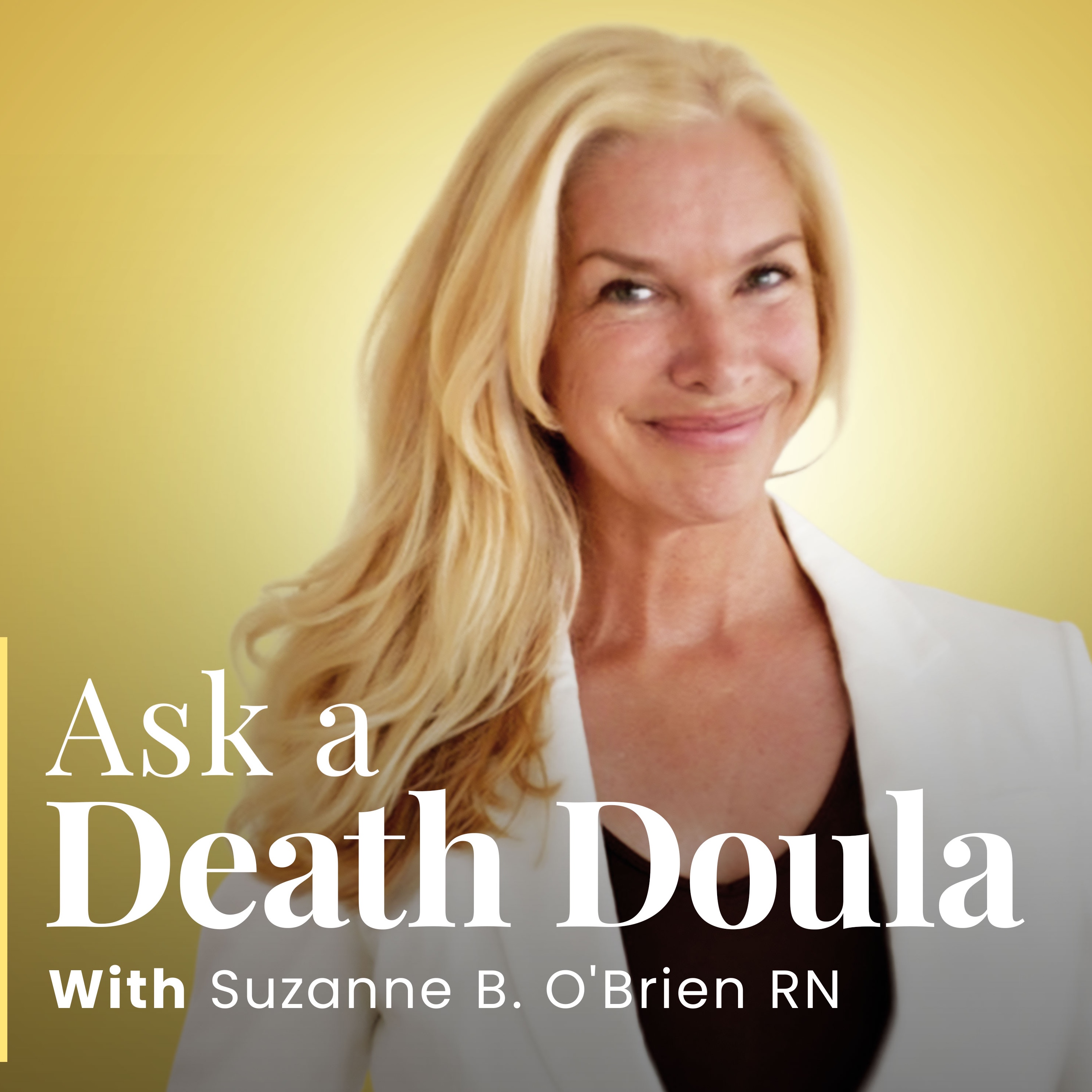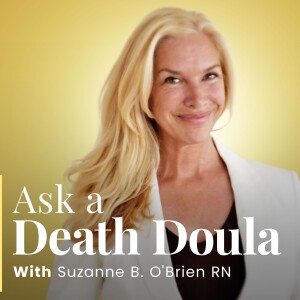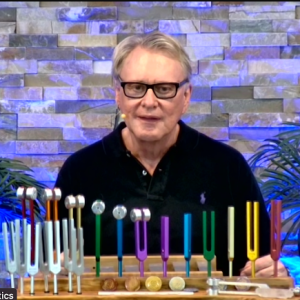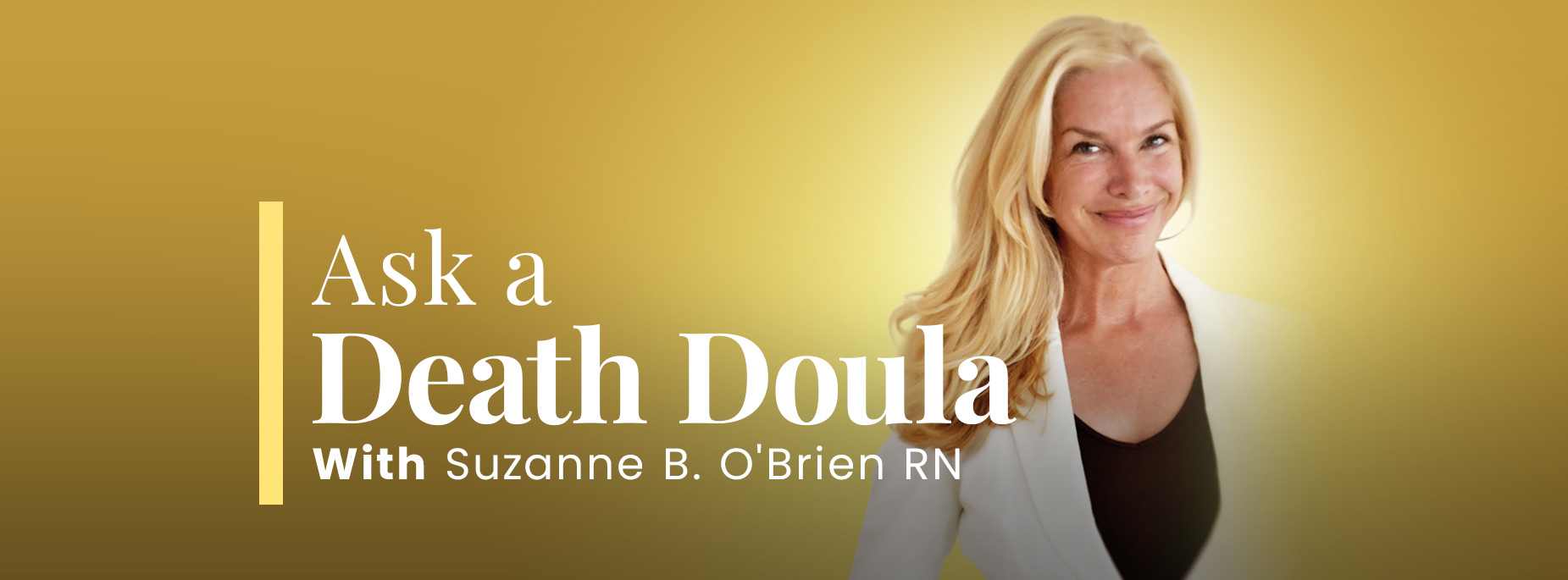
285.8K
Downloads
180
Episodes
Ask a Death Doula Podcast is a weekly show hosted by Hospice and Oncology nurse Suzanne B. O’Brien. Suzanne is the CEO and founder of International Doulagivers Institute. This is a vital platform for discussions and interviews that will bring back death into the natural fold of life. Ask a Death Doula will share vital education on how to care for those who are dying as well as sharing inspiring stories from working at the bedside with over 1000 dying people from all around the world. Please visit www.doulagivers.com to access our free education and resource center. About International Doulagivers Institute: The goal of Doulagivers Institute is simple and powerful - to provide affordable and accessible education and support to everyone in the world so that every person has the opportunity to die with comfort and dignity in their own home. Death is something that we all have in common no matter our race, religion, or socioeconomic status. We believe that this education to support people to have the most positive end of life experience is a human right, not a privilege.
Ask a Death Doula Podcast is a weekly show hosted by Hospice and Oncology nurse Suzanne B. O’Brien. Suzanne is the CEO and founder of International Doulagivers Institute. This is a vital platform for discussions and interviews that will bring back death into the natural fold of life. Ask a Death Doula will share vital education on how to care for those who are dying as well as sharing inspiring stories from working at the bedside with over 1000 dying people from all around the world. Please visit www.doulagivers.com to access our free education and resource center. About International Doulagivers Institute: The goal of Doulagivers Institute is simple and powerful - to provide affordable and accessible education and support to everyone in the world so that every person has the opportunity to die with comfort and dignity in their own home. Death is something that we all have in common no matter our race, religion, or socioeconomic status. We believe that this education to support people to have the most positive end of life experience is a human right, not a privilege.
Episodes

Thursday Jun 08, 2023
How to Fill the ”Hospice Gap”
Thursday Jun 08, 2023
Thursday Jun 08, 2023
Date: 6/7/23
Topic #2 What Hospice Care Isn’t
Topic #3 What YOU Need to Know to Fill the "Hospice Gap"
|
Everyone who attends the 90-Minute Training will receive a free copy of this invaluable resource (a $49 value!) as a thank you for their participation. Click Here to Register and Spread the Word! |
Links Mentioned in This Episode
<<Click here to get your copy of the The Doulagivers Hospice Handbook

Wednesday May 31, 2023
The Marriage of Death and Spirituality
Wednesday May 31, 2023
Wednesday May 31, 2023
Date: 6/1/23
the things I witnessed…
the things I learned…
the things dying people shared with me… changed my LIFE!
I can honestly say that the most painful experiences I have been through turned out to be my greatest teachers.
While working at the bedside, I discovered that this was the perspective shared by many of my dying patients. They were able to reflect on their own experiences from a different point of view to locate the good in them - uncovering the hidden meaning within them and finding the path towards soul growth.
In This Episode, You Will Learn:
Topic #2 How looking at life with a different lens of perspective- you can see the lessons and gifts revealed in ALL circumstances.
Topic #3 How we can live in a higher vibrational frequency now by using "The R.A.I. Technique".
Links Mentioned in This Episode:
<<Click here to reserve you seat in the FREE Doulagivers Universal Life Mastery Masterclass Webinar (ULM) June 7th

Wednesday May 24, 2023
How to Care for Dying Veterans
Wednesday May 24, 2023
Wednesday May 24, 2023
In This Episode, You Will Learn:
Topic #2 How the complex trauma that veterans experience prevents them from having a positive end of life.
Topic #3 How the new studies of psychedelic therapies may help veterans at the end of life and life
Links Mentioned in This Episode:
Doulagivers Level 1 End of Life Doula Training Veterans Edition Click here
Learn More: Doulagivers Institute Click here

Wednesday May 03, 2023
How The Death Positive Movement is Giving us Life
Wednesday May 03, 2023
Wednesday May 03, 2023
Date: 5/3/23
Death is having a rebirth!
People today are going back to their roots with the re-adoption of home wakes and funerals. Centuries ago, this was the common way to handle death. People would die at home and remain there for the viewing and the ceremony to honor their life. In fact, the “living room” was given its name because that’s where those who were still alive congregated before they went into the parlor to pay their respects to the deceased person.
In This Episode, You Will Learn:
Topic #2 How by doing these 2 things makes a better end of life experience by 80%-90%.
Topic #3 Why Death is actually our greatest teacher about life.
Links Mentioned in This Episode:
End of Life Level 1 Training for Family Caregivers Click here
Learn More: Doulagivers Institute Click here

Monday Apr 17, 2023
Zimbabwe: The start of the Death Doula Movement
Monday Apr 17, 2023
Monday Apr 17, 2023
Date: 4/18/23
I have been a hospice nurse since 2008, but it was on a volunteer trip to Zimbabwe, Africa, that I was taught the true power of our presence as the best medicine there is.
In This Episode, You Will Learn:
Topic #2 The Great Teachings From Those at Island Hospice
Topic #3 How We are a Global Community
Links Mentioned in This Episode:
End of Life "World Training Day" for Family Caregivers Click here
Free Family Caregiver Resource Center Click here
Learn More: Doulagivers InstituteClick here

Tuesday Apr 11, 2023
Caregiver Syndrome and How to Avoid it
Tuesday Apr 11, 2023
Tuesday Apr 11, 2023
Date: 4/13/23
Caregiver Syndrome and How to Avoid It
Brief summary of episode: Family caregivers are often faced with a unique set of challenges as they juggle the demands of work, family and caregiving. From managing complex medical tasks to navigating legal and financial issues, it can be difficult for caregivers to find balance in their lives while providing the best possible care for their loved ones. At the end of life, it is common for a family member (usually an adult daughter) to be suddenly thrown into a position where they are fully responsible for the care of their dying loved one. Although hospice services help tremendously with structuring a care plan and receiving the necessary equipment and medications to provide this care, the family is still responsible for the majority of hands-on care. Because the current system leaves most of the work to unpaid family members, it takes a toll on already stressed and grieving individuals and leads to Caregiver Syndrome - a silent epidemic that is taking place in our country and around the world as a direct result of an inadequate elder and end-of-life care system. We can, and we must do better.
In This Episode, You Will Learn:
Topic #2 Why it's Important to understand.
Topic #3 How you can Avoid it.
Free Family Caregiver Resource Center Click here
Learn More: Doulagivers InstituteClick here

Wednesday Feb 01, 2023
Sound Healing for Health
Wednesday Feb 01, 2023
Wednesday Feb 01, 2023
SomaEnergetics is a series of Sound Therapy Techniques developed by David Hulse at the turn of the century using the power of the ancient frequencies of the solfeggio. We use the highest quality Solfeggio Tuning forks, which are custom-made for SomaEnergetics by a manufacturer who has over 4 decades of experience developing quality, custom tuning forks. We offer training in live workshops and via Self-Study Online Courses. Our Color Solfeggio Energy Tuners and Body Tuners are available exclusively from SomaEnergetics.
This wonderful quote from Dr. Horowitz and Dr. Puleo’s, book – Healing Codes for the Biological Apocalypse sums up the importance of this work: "Nature and Grace"—the physical and the spiritual—reflect each other and reveal "the great fact" that there is a secret tone scale—or set of sounds—that vibrates at the exact frequencies required to transform spirit to matter, or matter to spirit"
FREE UNIVERSAL LIFE MASTERY MASTERCLASS- Three Steps to Conscious Awakening
Register Here: https://my.demio.com/ref/HIjLO8sw1heZ...
We are on the brink of a personal and collective shift. The world is full of chaos, and we are untethered to our spiritual being part of who we are and why we are here.
In this free webinar, you will learn:
1) How this is the time in our humanity for the big shift to take place. We are being called to go from a world running on fear, power, and wealth to one of love and compassion.
2) How when we raise our individual consciousness, we raise the collective consciousness.
3) How new research in both Neuroscience and Quantum Physics is validating that we can take control of our mind, body, and life to awaken to our highest consciousness.
SAVE YOUR SPOT Here: https://my.demio.com/ref/HIjLO8sw1heZ...
To Learn More About SomaEnergetics CLICK HERE: https://somaenergetics.com/collection...

Thursday Jan 05, 2023

Tuesday Nov 29, 2022
Can I Introduce you to Death Doula Network of BC?
Tuesday Nov 29, 2022
Tuesday Nov 29, 2022
I’m thrilled to introduce you to these two heart centered dynamic women.
Karen Hendrickson and Jo-Anne Haun are the founders of Death Doula Network of BC.
They are passionate about making and creating connections throughout the Death industry, communities, and the world.
I LOVE to support people who are doing amazing work and making the world a better place. Here are two of these women.
In this episode of Ask a Death Doula, You will hear:
-How Death Doula Network of BC was born
-The Blessings of COVID bringing global awareness to end of life
-How Doulas are an asset to patients, families and the medical team
We are a global family and Doulas are being used all over the world now to help provide the much needed end of life support to help create a positive end of life.
“With the right education, kindness and support, end of life can be the natural and sacred experience it was meant to be”~ Suzanne
Learn More about Death Doula Network of BC Here: https://ddnbc.com
Take the next FREE Level 1 End of Life Doula Training Here: https://www.doulagivers.com

Wednesday Nov 02, 2022
Forgiveness at the End of Life and Why You Should Not Wait
Wednesday Nov 02, 2022
Wednesday Nov 02, 2022
Whether it’s a simple spat with your spouse or long-held resentment toward a family
Forgiveness will set you free and allow you to create the future exactly the way you want it to be.
In this webinar, you will learn:
1. What forgiveness is & why we must learn to forgive.
Working with those at the end of life has taught me EVERYTHING about life and about how to live fully. Sharing this information with you is my life’s purpose, and the greatest lesson that I could ever share with you is the transformative power of forgiveness.
Suzanne B. O'Brien RN
